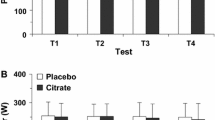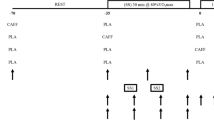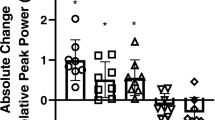Abstract
Purpose
To investigate the effect of caffeine ingestion on the 3-min all-out test (3MT) performance and plasma electrolytes in athletes.
Methods
Fifteen collegiate male basketball players were recruited and completed two trials separated by at least 1 week in caffeine (CAF, 6 mg kg−1) and placebo conditions. During the first visit, participants performed an incremental cycling test to determine their 3MT resistance. After a familiarization trial, participants performed a CAF or PL trial according to a randomized crossover design. One hour after ingesting capsules, the participants performed the 3MT to estimate the end-test power (EP) and work done above EP (WEP). Blood samples for sodium (Na+), potassium (K+), pH, and lactate concentrations were drawn pretest, 1 h after ingestion, and posttest.
Results
Significant differences in WEP (CAF vs. PL, 13.4 ± 3.0 vs. 12.1 ± 2.7 kJ, P < 0.05) but not in EP (CAF vs. PL, 242 ± 37 vs. 244 ± 42 W, P > 0.05) were determined between the conditions. Compared with the PL condition, the CAF condition yielded significantly higher power outputs (60–150 s), a lower fatigue rate during the 3MT (CAF vs. PL, 0.024 ± 0.007 vs. 0.029 ± 0.006 s−1, P < 0.05), a significantly higher lactate concentration after the 3MT, and significantly lower K+ concentrations at 1 h after caffeine ingestion. There were no significant interaction effects for pH and Na+ concentrations.
Conclusions
Caffeine ingestion did not change EP but improved WEP and the rate of decline in power output during short-term, severe exercise.


Similar content being viewed by others
Abbreviations
- 3MT:
-
3-Minute all-out test
- CAF:
-
Caffeine treatment
- CI:
-
Confidence intervals
- CNS:
-
Central nervous system
- CP:
-
Critical power
- EP:
-
End-test power
- ES:
-
Effect size
- FR:
-
Fatigue rate
- GET:
-
Gas exchange threshold
- HR:
-
Heart rate
- HRpeak:
-
Peak heart rate
- K+ :
-
Potassium
- Na+ :
-
Sodium
- PL:
-
Placebo treatment
- RPE:
-
Rating of perceived exertion
- SD:
-
Standard deviation
- \(\dot{V}{\text{O}}_{2}\) :
-
Oxygen uptake
- \(\dot{V}{\text{O}}_{2}\)max:
-
Maximal oxygen uptake
- \(\dot{V}{\text{O}}_{2}\)peak:
-
Peak oxygen uptake
- Wʹ:
-
Curvature constant
- WEP:
-
Work done above EP
References
Astorino TA, Roberson DW (2010) Efficacy of acute caffeine ingestion for short-term high-intensity exercise performance: a systematic review. J Strength Cond Res 24(1):257–265. doi:10.1519/JSC.0b013e3181c1f88a
Astorino TA, Terzi MN, Roberson DW, Burnett TR (2011) Effect of caffeine intake on pain perception during high-intensity exercise. Int J Sport Nutr Exerc Metab 21(1):27–32
Bazzucchi I, Felici F, Montini M, Figura F, Sacchetti M (2011) Caffeine improves neuromuscular function during maximal dynamic exercise. Muscle Nerve 43(6):839–844. doi:10.1002/mus.21995
Beaver WL, Wasserman K, Whipp BJ (1986) A new method for detecting anaerobic threshold by gas exchange. J Appl Physiol 60(6):2020–2027
Bell DG, Jacobs I, Ellerington K (2001) Effect of caffeine and ephedrine ingestion on anaerobic exercise performance. Med Sci Sports Exerc 33(8):1399–1403
Bergstrom HC, Housh TJ, Zuniga JM, Traylor DA, Camic CL, Lewis RW Jr, Schmidt RJ, Johnson GO (2013) The relationships among critical power determined from a 3-min all-out test, respiratory compensation point, gas exchange threshold, and ventilatory threshold. Res Q Exerc Sport 84(2):232–238
Black CD, Waddell DE, Gonglach AR (2015) Caffeine’s ergogenic effects on cycling: neuromuscular and perceptual factors. Med Sci Sports Exerc 47(6):1145–1158. doi:10.1249/MSS.0000000000000513
Borg G (1970) Perceived exertion as an indicator of somatic stress. Scand J Rehab Med 2:92–98
Burnley M, Doust JH, Vanhatalo A (2006) A 3-min all-out test to determine peak oxygen uptake and the maximal steady state. Med Sci Sports Exerc 38(11):1995–2003
Cheng CF, Yang YS, Lin HM, Lee CL, Wang CY (2012) Determination of critical power in trained rowers using a three-minute all-out rowing test. Eur J Appl Physiol 112(4):1251–1260. doi:10.1007/s00421-011-2081-2
Cohen J (1988) Statistical power analysis for the behavioral sciences, 2nd edn. Laurence Erlbaum Associates, New Jersey
Collomp K, Ahmaidi S, Audran M, Chanal JL, Prefaut C (1991) Effects of caffeine ingestion on performance and anaerobic metabolism during the Wingate Test. Int J Sports Med 12(5):439–443
Collomp K, Ahmaidi S, Chatard JC, Audran M, Prefaut C (1992) Benefits of caffeine ingestion on sprint performance in trained and untrained swimmers. Eur J Appl Physiol 64(4):377–380
Crowe MJ, Leicht AS, Spinks WL (2006) Physiological and cognitive responses to caffeine during repeated, high-intensity exercise. Int J Sport Nutr Exerc Metab 16(5):528–544
Davis JK, Green JM (2009) Caffeine and anaerobic performance: ergogenic value and mechanisms of action. Sports Med 39(10):813–832. doi:10.2165/11317770-000000000-00000
Dekerle J, Vanhatalo A, Burnley M (2008) Determination of critical power from a single test. Sci Sports 23:231–238. doi:10.1016/j.scispo.2007.06.015
Desbrow B, Biddulph C, Devlin B, Grant GD, Anoopkumar-Dukie S, Leveritt MD (2012) The effects of different doses of caffeine on endurance cycling time trial performance. J Sports Sci 30(2):115–120. doi:10.1080/02640414.2011.632431
Dodd SL, Brooks E, Powers SK, Tulley R (1991) The effects of caffeine on graded exercise performance in caffeine naive versus habituated subjects. Eur J Appl Physiol 62(6):424–429
Doherty M (1998) The effects of caffeine on the maximal accumulated oxygen deficit and short-term running performance. Int J Sport Nutr Exerc Metab 8(2):95–104
Doherty M, Smith PM (2005) Effects of caffeine ingestion on rating of perceived exertion during and after exercise: a meta-analysis. Scand J Med Sci Sports 15(2):69–78
Fitts RH (1994) Cellular mechanisms of muscle fatigue. Physiol Rev 74(1):49–94
Forbes SC, Candow DG, Little JP, Magnus C, Chilibeck PD (2007) Effect of Red Bull energy drink on repeated Wingate cycle performance and bench-press muscle endurance. Int J Sport Nutr Exerc Metab 17(5):433–444
Fukuda DH, Smith AE, Kendall KL, Stout JR (2010) The possible combinatory effects of acute consumption of caffeine, creatine, and amino acids on the improvement of anaerobic running performance in humans. Nutr Res 30(9):607–614. doi:10.1016/j.nutres.2010.09.004
Gaesser GA, Rich RG (1985) Influence of caffeine on blood lactate response during incremental exercise. Int J Sports Med 6(4):207–211
Ganio MS, Klau JF, Casa DJ, Armstrong LE, Maresh CM (2009) Effect of caffeine on sport-specific endurance performance: a systematic review. J Strength Cond Res 23(1):315–324. doi:10.1519/JSC.0b013e31818b979a
Gliottoni RC, Motl RW (2008) Effect of caffeine on leg-muscle pain during intense cycling exercise: possible role of anxiety sensitivity. Int J Sport Nutr Exerc Metab 18(2):103–115
Gliottoni RC, Meyers JR, Arngrimsson SA, Broglio SP, Motl RW (2009) Effect of caffeine on quadriceps muscle pain during acute cycling exercise in low versus high caffeine consumers. Int J Sport Nutr Exerc Metab 19(2):150–161
Goldstein ER, Ziegenfuss T, Kalman D, Kreider R, Campbell B, Wilborn C, Taylor L, Willoughby D, Stout J, Graves BS, Wildman R, Ivy JL, Spano M, Smith AE, Antonio J (2010) International society of sports nutrition position stand: caffeine and performance. J Int Soc Sports Nutr 7(1):5. doi:10.1186/1550-2783-7-5
Gonglach AR, Ade CJ, Bemben MG, Larson RD, Black CD (2016) Muscle pain as a regulator of cycling intensity: effect of caffeine ingestion. Med Sci Sports Exerc 48(2):287–296. doi:10.1249/MSS.0000000000000767
Graham TE, Spriet LL (1995) Metabolic, catecholamine, and exercise performance responses to various doses of caffeine. J Appl Physiol 78(3):867–874
Greer F, McLean C, Graham TE (1998) Caffeine, performance, and metabolism during repeated Wingate exercise tests. J Appl Physiol 85(4):1502–1508
Hopkins W (2006) Estimating sample size for magnitude-based inferences. Sportscience 10:63–70
Jenkins NT, Trilk JL, Singhal A, O’Connor PJ, Cureton KJ (2008) Ergogenic effects of low doses of caffeine on cycling performance. Int J Sport Nutr Exerc Metab 18(3):328–342
Johnson TM, Sexton PJ, Placek AM, Murray SR, Pettitt RW (2011) Reliability analysis of the 3-min all-out exercise test for cycle ergometry. Med Sci Sports Exerc 43(12):2375–2380. doi:10.1249/MSS.0b013e318224cb0f
Kalmar JM (2005) The influence of caffeine on voluntary muscle activation. Med Sci Sports Exerc 37(12):2113–2119
Kalmar JM, Cafarelli E (1999) Effects of caffeine on neuromuscular function. J Appl Physiol 87(2):801–808
Kolbe T, Dennis SC, Selley E, Noakes TD, Lambert MI (1995) The relationship between critical power and running performance. J Sports Sci 13(3):265–269
Lee CL, Cheng CF, Lin JC, Huang HW (2012) Caffeine’s effect on intermittent sprint cycling performance with different rest intervals. Eur J Appl Physiol 112(6):2107–2116. doi:10.1007/s00421-011-2181-z
Lindinger MI, Graham TE, Spriet LL (1993) Caffeine attenuates the exercise-induced increase in plasma [K+] in humans. J Appl Physiol 74(3):1149–1155
McKenna MJ, Bangsbo J, Renaud JM (2008) Muscle K+, Na+, and Cl disturbances and Na+–K+ pump inactivation: implications for fatigue. J Appl Physiol 104(1):288–295
Mohr M, Nielsen JJ, Bangsbo J (2011) Caffeine intake improves intense intermittent exercise performance and reduces muscle interstitial potassium accumulation. J Appl Physiol 111(5):1372–1379. doi:10.1152/japplphysiol.01028.2010
Monod H, Scherrer J (1965) The work capacity of a synergic muscular group. Ergonomics 8:329–338
Moritani T, Nagata A, deVries HA, Muro M (1981) Critical power as a measure of physical work capacity and anaerobic threshold. Ergonomics 24(5):339–350
Motl RW, O’Connor PJ, Dishman RK (2003) Effect of caffeine on perceptions of leg muscle pain during moderate intensity cycling exercise. J Pain 4(6):316–321
Motl RW, O’Connor PJ, Tubandt L, Puetz T, Ely MR (2006) Effect of caffeine on leg muscle pain during cycling exercise among females. Med Sci Sports Exerc 38(3):598–604
Naharudin MN, Yusof A (2013) Fatigue index and fatigue rate during an anaerobic performance under hypohydrations. PLoS One 8(10):e77290. doi:10.1371/journal.pone.0077290
Plaskett CJ, Cafarelli E (2001) Caffeine increases endurance and attenuates force sensation during submaximal isometric contractions. J Appl Physiol 91(4):1535–1544
Poole DC, Ward SA, Gardner GW, Whipp BJ (1988) Metabolic and respiratory profile of the upper limit for prolonged exercise in man. Ergonomics 31:1265–1279
Santos Rde A, Kiss MA, Silva-Cavalcante MD, Correia-Oliveira CR, Bertuzzi R, Bishop DJ, Lima-Silva AE (2013) Caffeine alters anaerobic distribution and pacing during a 4000-m cycling time trial. PLoS One 8(9):e75399. doi:10.1371/journal.pone.0075399
Shimoda M, Kawakami Y (2005) Critical power determination with ergometry rowing: relation to rowing performance. Int J Sport Health Sci 3:21–26
Simmonds MJ, Minahan CL, Sabapathy S (2010) Caffeine improves supramaximal cycling but not the rate of anaerobic energy release. Eur J Appl Physiol 109(2):287–295. doi:10.1007/s00421-009-1351-8
Smith JC, Dangelmaier BS, Hill DW (1999) Critical power is related to cycling time trial performance. Int J Sports Med 20(6):374–378
Vanhatalo A, Doust JH, Burnley M (2007) Determination of critical power using a 3-min all-out cycling test. Med Sci Sports Exerc 39(3):548–555
Warren GL, Park ND, Maresca RD, McKibans KI, Millard-Stafford ML (2010) Effect of caffeine ingestion on muscular strength and endurance: a meta-analysis. Med Sci Sports Exerc 42(7):1375–1387. doi:10.1249/MSS.0b013e3181cabbd8
Wiles JD, Coleman D, Tegerdine M, Swaine IL (2006) The effects of caffeine ingestion on performance time, speed and power during a laboratory-based 1 km cycling time-trial. J Sports Sci 24(11):1165–1171
Woolf K, Bidwell WK, Carlson AG (2008) The effect of caffeine as an ergogenic aid in anaerobic exercise. Int J Sport Nutr Exerc Metab 18(4):412–429
Acknowledgments
The authors wish to thank the participants who contributed their time and effort to undertake this study and to Polypact International Co., Ltd., who sponsored the consumable materials of Cortex metabolic analysis system. This work is particularly supported by “Aim for the Top University Plan” of National Taiwan Normal University and the Ministry of Education, Taiwan.
Author information
Authors and Affiliations
Corresponding author
Ethics declarations
Conflict of interest
The authors have no conflict of interest.
Additional information
Communicated by Anni Vanhatalo.
Rights and permissions
About this article
Cite this article
Cheng, CF., Hsu, WC., Kuo, YH. et al. Caffeine ingestion improves power output decrement during 3-min all-out exercise. Eur J Appl Physiol 116, 1693–1702 (2016). https://doi.org/10.1007/s00421-016-3423-x
Received:
Accepted:
Published:
Issue Date:
DOI: https://doi.org/10.1007/s00421-016-3423-x




